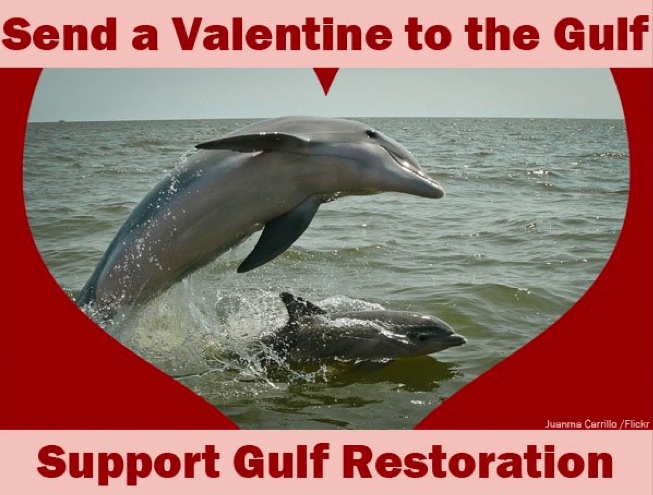A Valentine for the Gulf

There's speculation on the Gulf Coast that BP could soon reach a settlement in the civil suit over its 2010 Deepwater Horizon oil disaster. Opening arguments in the historic case, which has been dubbed the "trial of the century," are set to begin on Feb. 27 in New Orleans. But rumor has it that a settlement could be announced as soon as Feb. 21 -- Mardi Gras. The former head of the U.S. Justice Department's Environmental Crimes Section has said there's a 70 to 80 percent chance of a settlement before trial.
The looming possibility of a deal has added urgency to the effort to pass federal legislation that would direct most of the penalties -- as much as $20 billion -- back to the region. As the law now stands, that money can be spent elsewhere in the federal budget.
But Gulf advocates have organized a grassroots action aimed at keeping that from happening -- what they're billing as a way of "sending some Valentine's Day love to the Gulf."
The Mississippi River Delta Restoration Campaign is spending today and the rest of the week urging members of Congress to pass the Resources and Ecosystems Sustainability, Tourist Opportunities and Revived Economy or RESTORE Act (S. 1400), which would send back to Gulf communities at least 80 percent of the Clean Water Act penalties paid by BP and others responsible for the spill. The bill would create a council with the heads of five federal agencies and governors of the five Gulf states -- Florida, Alabama, Mississippi, Louisiana and Texas -- to distribute most of the money.
"If Congress doesn't act soon, this money may not be used for repairing the environmentally and economically devastated region," the campaign said in its announcement about the action.
More than 100 faith leaders are also appealing to Congress to take action on the RESTORE Act, sending a letter stating:
God's creation groans from the oil and chemical contaminants that still permeate the beaches, wetlands and waters upon which so many rely for survival. Now more than ever, we need the leadership of the U.S. Congress to ensure that Gulf Coast communities, economies and God's creation do not undertake this recovery unaided.
The idea of dedicating Clean Water Act penalties to Gulf restoration has been endorsed by two official reports on the spill -- one conducted by Navy Secretary and former Mississippi Gov. Ray Mabus, and another from the bipartisan National Commission on the Deepwater Horizon Oil Spill and Offshore Drilling. The RESTORE Act offers the added plus of job creation: A recent study by Duke University researchers found that investing penalties in ecosystem restoration could create jobs that would benefit at least 140 businesses across 37 states.
The RESTORE Act has bipartisan support. Sen. Mary Landrieu (D-La.) is the bill's original sponsor, and eight other Gulf state senators from both major parties have signed on as co-sponsors: Thad Cochran (R-Miss.), Kay Bailey Hutchison (R-Texas), Bill Nelson (D-Fla.), Marco Rubio (R-Fla.), Jeff Sessions (R-Ala.), Richard Shelby (R-Ala.), David Vitter (R-La.) and Roger Wicker (R-Miss.). The only Gulf state senator who hasn't signed on is John Cornyn (R-Texas), who has said he doesn't think the council is a good way to direct money.
The Senate placed the RESTORE Act on its legislative calendar in December but has taken no action since then. Harrison County, Miss. commissioner Connie Rockco recently observed that while the measure has broad support, "the toxic environment of Washington politics has stalled the bill."
The Gulf advocates' Valentine's campaign is calling on Senate leaders Mitch McConnell (R-Ky.) and Harry Reid (D-Nev.) to bring the bill to the floor for consideration. To learn more about the effort, click here.
(Image from Restore the Mississippi Delta's Facebook page.)
Tags
Sue Sturgis
Sue is the former editorial director of Facing South and the Institute for Southern Studies.
